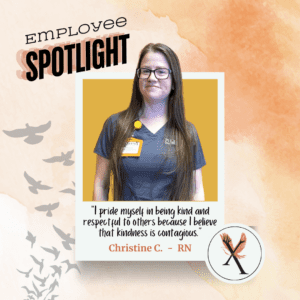Understand Why Patients and Families Rely On Hospice Care
Most people don’t think about hospice until they or a loved one are ready to begin receiving this level of care. Until then, what you see on movies and television or what you’ve heard about from friends is the only point of reference.
However, hospice turns out to be more than what you suspected. Hospice helps with a variety of needs other than what you may be familiar with.
Patients and families commonly ask the following questions as they weigh their options for how to approach a life-limiting illness.
Is Hospice Only For End-Of-Life?
A common misconception about hospice is that it is only for people who are “near the end.” In truth, you qualify for hospice care when your doctor has diagnosed you with an illness with a life expectancy of six months or less.
After you qualify, your hospice team provides care and comfort, and helps you manage the symptoms of your illness at home. This benefit gives many patients more time and opportunities to be in their own home among family and friends.
Is Hospice the Same As Palliative Care?
Palliative care and hospice care are not the same. You or a loved one can receive palliative care for symptom management while still treating a life-limiting illness.
Hospice is for those who may have chosen to stop treatment for that illness or who want to continue living as full a life as possible with symptom relief, spiritual care and family support after a diagnosis with a life expectancy of six months or less.
How Is Comfort Care Different From Hospice or Palliative Care?
Sometimes used interchangeably with hospice care, comfort care is a name for symptom management and pain relief that is provided during palliative care or hospice care. Comfort care is a very common need for patients who have chosen either of these benefits.
Does Hospice Mean a Person Feels Defeated?
Hospice never means that you’re giving up or aren’t strong. On the contrary, it is courageous to decide you no longer wish to treat your life-limiting illness and shift your focus to a new phase of your journey.
It takes bravery and strength to explain your care needs. While receiving hospice at home, you or a loved one can focus on spending quality time with family and friends, as free as possible of your illness’s symptoms, including pain.
Is Hospice Only Available In a Facility?
Hospice care can take place in a facility, but that isn’t your only option. You or a loved one can receive all the benefits of hospice at home through a hospice provider. Receiving hospice in your home allows you or a loved one to experience this phase of their life’s journey in a familiar and comforting environment.
Is Hospice One-Size-Fits-All?
No. Although Medicaid and Medicare or your private insurance company set the guidelines for what services are provided through this benefit, each patient receives an individual plan of care. That plan of care is implemented by the hospice team, and no two plans are exactly alike.
Each patients’ medical needs, equipment, and supplies for their terminal illness are provided, and hospice services can be based on preferences. For example, some people receiving hospice care wish to visit with a chaplain or a social worker, but others may not.
Is It True That Hospice Care Is Very Expensive For Families?
Hospice is not expensive. Medicaid and Medicare cover hospice care, including all the required medical supplies and equipment related to the hospice diagnosis.
Private insurance carriers also provide hospice benefits, as well. You or a loved one should never have to worry that hospice will create expenses that a family won’t be able to afford.
Is There Room For Holidays and Traditions During Hospice?
Yes! You or a loved one can decide how to experience them. Although holiday traditions and other celebrations may look a bit different, anyone receiving hospice should be able to experience life however they choose.
Is There More to Hospice, or Is It Just Pain Management?
Symptom management and pain relief is only a part of what hospice care provides. Hospice also includes these important benefits:
- 24-7, on-call nursing
- Collaboration with you or your loved one’s physician
- Chaplains for spiritual support
- Medical social workers
- Medication, supplies, and equipment related to your life-limiting illness
- Special skilled services when necessary, including physical, speech, and occupational therapists
- Trained volunteers for companionship and support
What Do Hospice Services Do For the Whole Family?
Hospice, unlike palliative care, also provides specific benefits for the family. Families receive bereavement support and respite care through a short-term facility to give caregivers relief.
Hospice providers give families peace of mind knowing their loved one is thoroughly cared for.
How Do I Know I’ve Found Excellent Hospice Services?
You might think that only a superior hospice provider offers all the aforementioned benefits and services. However, all hospice providers should deliver these services based on Medicaid and Medicare guidelines. What distinguishes a superior provider is how these services are implemented.
Look for a hospice provider guided by patience, honesty, and compassion. When you select understanding providers who provide their expertise with an empathetic heart for service, hospice benefits become even more valuable than expected. They become a source of guidance, love, and care that everyone deserves.






